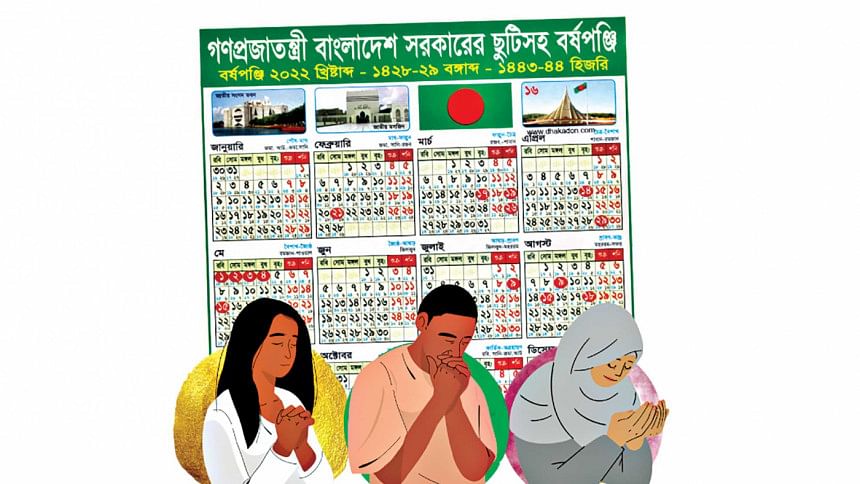When holidays are not an equal privilege

When Pahela Baishakh and Ramadan crossed paths this year, we got a day off to adequately celebrate while fasting, after two years spent cowering indoors owing to the pandemic at its peak.
What's even better is that Eid is near and so is another bout of holidays waiting to be spent with friends and family. No classes for the last days of Ramadan, and no exams at least until after the vacation. But that's not the reality for everyone when it comes to their own festivals, is it?
April 13 to 15 marked the calendar dates for Biju, Bishu, Sangrai, Boishu, and Changcran – the prominent socio-religious festivals of the Chakma, Marma, Tripura, Tanchangya, and Mro people. While the delightful glimpses of the festivals adorned our social media timelines, a lot of us chose to skip over the fact that there was something very peculiar about it all. Instead of being back home with their beloved ones for the most important festivals of the year, most of their youth were observing small-scale on-campus celebrations at best.
These dates aren't recognised as public holidays in Bangladesh, and so all public and private universities, along with other educational institutions, remain open with complete disregard. As if it couldn't get any worse, many even choose this very same timeline for holding exams alongside regular classes, which was indeed the case this year. It's not even surprising considering how the situation is nearly the same for the religious minorities of this country as well.
Students get to have rather sufficient breaks for both Eid and a few more special occasions, whereas most schools and colleges only allow a break as small as 3 to 5 days for an occasion like Durga Puja, the celebrations for which last for as long as 10 days.
In between discussions about these issues, one of the most common suggestions people leave is to make these festivals optional holidays for the ones celebrating. Although it sounds like a solution, it's a bare minimum and has a very real chance of not working out.
For instance, if they were optional holidays indeed and that allowed the indigenous or religious minority youths studying in educational institutions across the country to take a leave in the midst of an ongoing academic session, there's no guarantee that they'd receive fairly compensated make up lessons owing to the core problems in our inefficient, conventional schooling system. The same goes for workplaces and honorariums in an extended scenario. Paired with the raging discrimination these people already face in every aspect of life in this country, this will only let others weaponise their rightful freedom of cultural and religious expression.
Biju is not supposed to be celebrated solely in a congested campus in the urban heat of April, with academic stress and supressed sadness so palpable that it's apparent despite the smiling faces. Half of Durga Puja is not supposed to be spent running from class to class, jumping from assignment to presentation while merely reminiscing about the celebration.
This needs to change. And soon.
Hamama's problems smell like daruchini because she's dweep into them 24/7. Send help at [email protected]

 For all latest news, follow The Daily Star's Google News channel.
For all latest news, follow The Daily Star's Google News channel. 



Comments